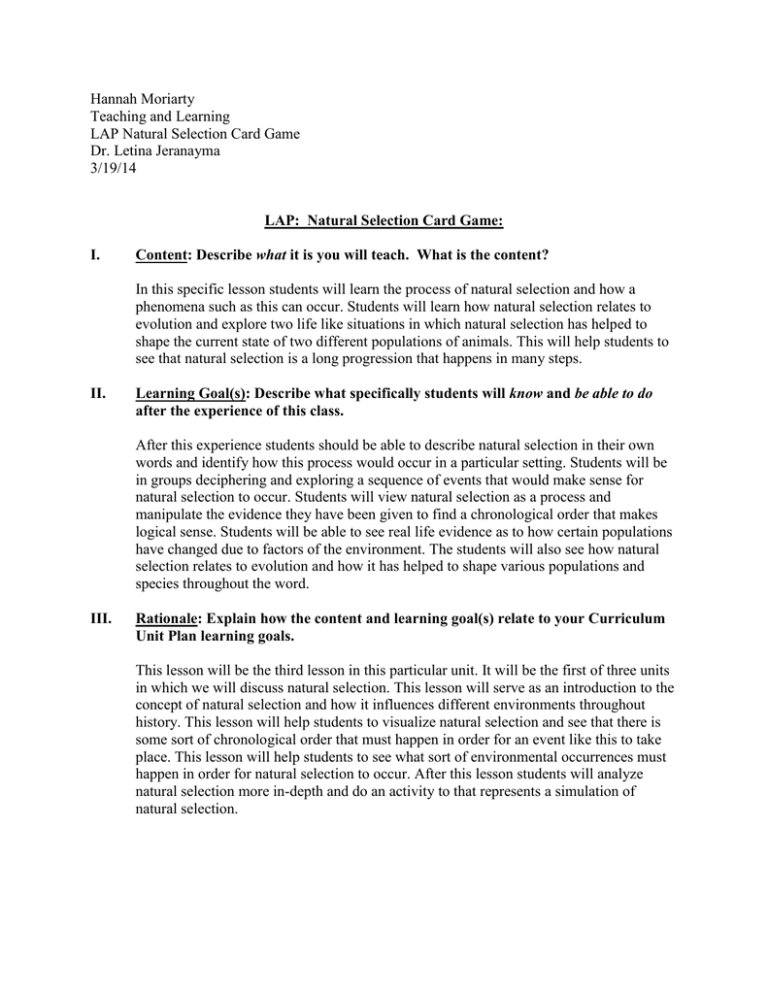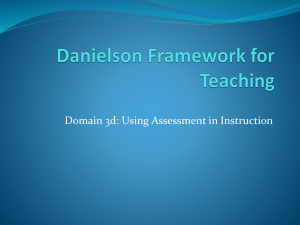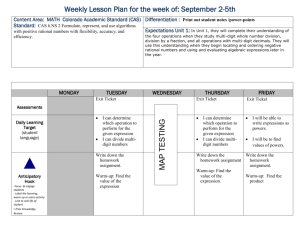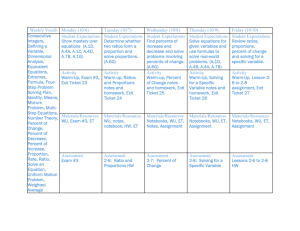Natural Selection Card Game LAP
advertisement

Hannah Moriarty Teaching and Learning LAP Natural Selection Card Game Dr. Letina Jeranayma 3/19/14 LAP: Natural Selection Card Game: I. Content: Describe what it is you will teach. What is the content? In this specific lesson students will learn the process of natural selection and how a phenomena such as this can occur. Students will learn how natural selection relates to evolution and explore two life like situations in which natural selection has helped to shape the current state of two different populations of animals. This will help students to see that natural selection is a long progression that happens in many steps. II. Learning Goal(s): Describe what specifically students will know and be able to do after the experience of this class. After this experience students should be able to describe natural selection in their own words and identify how this process would occur in a particular setting. Students will be in groups deciphering and exploring a sequence of events that would make sense for natural selection to occur. Students will view natural selection as a process and manipulate the evidence they have been given to find a chronological order that makes logical sense. Students will be able to see real life evidence as to how certain populations have changed due to factors of the environment. The students will also see how natural selection relates to evolution and how it has helped to shape various populations and species throughout the word. III. Rationale: Explain how the content and learning goal(s) relate to your Curriculum Unit Plan learning goals. This lesson will be the third lesson in this particular unit. It will be the first of three units in which we will discuss natural selection. This lesson will serve as an introduction to the concept of natural selection and how it influences different environments throughout history. This lesson will help students to visualize natural selection and see that there is some sort of chronological order that must happen in order for an event like this to take place. This lesson will help students to see what sort of environmental occurrences must happen in order for natural selection to occur. After this lesson students will analyze natural selection more in-depth and do an activity to that represents a simulation of natural selection. IV. Assessment: Describe how you and your students will know they have reached your learning goals. I will assess if my students have reached their learning goals in various ways throughout this lesson. First each student is required to answer a warm-up question that we will discuss as a class. This will help me to determine what students are able to grasp the information at hand and think in terms of natural selection. Next students will work in groups to decipher what chronological order an event like natural selection must occur in. Finally they must fill out an exit ticket demonstrating that they understand how environmental factors affect natural selection and how these influences can change a population. V. Personalization and equity: Describe how you will provide for individual student strengths and needs. How will you and your lesson consider the needs of each student and scaffold learning? How specifically will ELL students and students with learning disabilities gain access and be supported? I.E.P: My students with I.E.Ps will receive similar accommodations as my students who are E.L.Ls as well as the rest of the class. All students will receive written and oral instructions as well as read and discuss an article as a class about natural selection. Students will be working in groups to decipher an easy to read example of natural selection and they will be filling out a graphic organizer formatted set of notes. Finally all students will be required to fill out an exit ticket that will help me as a teacher decipher who has truly grasped the concepts at hand and who needs more individualized attention. E.L.L: I will offer my students who are E.L.Ls similar accommodations to as my students who have I.E.Ps as well as the rest of the class. Each student will be required to answer a warm-up question that will get them thinking like a scientist and introduce them to natural selection. As a class we will read a simple to read article on natural selection and as class discuss the concepts of natural selection. The students will also work in groups to understand the chronological order of natural selection and what events must occur in order to initiate this prolonged process. Finally all students will be required to fill out an exit ticket that will help me as a teacher decipher who has truly grasped the concepts at hand and who needs more individualized attention. VI. Activity description and agenda a. Describe the activities that will help your students understand the content of your class lesson by creating an agenda with time frames for your class. Be prepared to explain why you think each activity will help students on the path toward understanding. i. Warm-Up Question: ii. iii. iv. v. In a population full of ants half of the ants eat rice and the other half eat sunflower seeds. What would happen to this population if rice was to no longer grow in the area due to environmental changes? This question will help students to think in the mindset of natural selection Article read: We will read an easy to read article on natural selection as a class and discuss the findings of this article Student Guided Notes: Next as a class we will define natural selection and discuss how this phenomena relates to evolution Card Game Activity: Students will be given cards with three examples of different animal populations. They must arrange these cards in the correct order that natural selection would occur in these specific populations. As a class we will then go over the correct answer and the students will record this evidence in their notebooks. Exit Ticket: In order for natural selection to occur what must happen? This will help me to determine what students are able to determine that certain environmental factors or changes must occur in order for natural selection to take place. b. What particular challenges, in terms of student learning or implementing planned activity, do you anticipate and how will you address them? I can foresee some students having an easier time finding the chronological order of the different examples we will discuss in class. I will avoid this issue of having students have too much time in between activities by giving them the three examples one at a time and a time limit to find out the order so that each student is allowed to work at their own pace. VII. 5.3 List the Massachusetts Learning Standards this lesson addresses. Explain how evolution through natural selection can result in changes in biodiversity through the increase or decrease of genetic diversity within a population. VIII. Reflection a. In light of all areas of planning, but especially in terms of your stated purpose and learning goals, in what ways was the activity(ies) successful? How do you know? In what ways was it not successful? How might the activity be planned differently another time? Overall this activity was rather successful because of its engaging manner. The students viewed putting these steps into the correct chronological order as solving puzzle and worked together to figure the correct pattern. By students working together and attempting to make sense of this information they were able to make it their own and better absorb the information at hand. The activity was a simple way to show students the relationship between natural selection and evolution and certain occurrences that must happen in order for natural selection to occur. If I were to improve this lesson I would break the students up into smaller groups so that more peer to peer learning takes place and the groups are able to work together more effectively. b. What did you learn from the experience of this lesson that will inform your next LAP? This lesson has helped me to realize that having students work in smaller groups may at times force them to work outside of their comfort zones but also pushes them to work harder and think more independently. I need to work on varying up the size of my groups based on the assignment to give my students the support they need as well as the push them to be more independent learners at the same time.


